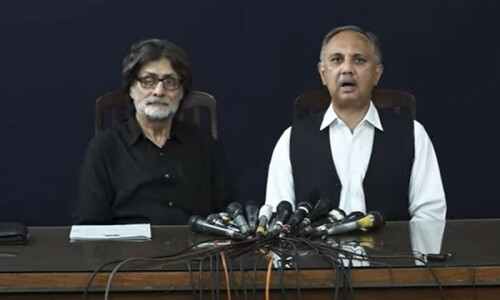ISLAMABAD: Chief Justice of Pakistan (CJP) Umar Ata Bandial on Wednesday observed that Pakistan is passing through a transition and everyone must show courage, fortitude and patience to come out of this situation, especially the economic conditions.
“Let us learn to deal with this situation instead of complaining,” the CJP observed while heading a three-judge Supreme Court bench that had taken up a set of challenges to the Supreme Court (Review of Judgements and Orders) Act 2023, as well as the Election Commission of Pakistan’s (ECP) review petition against the April 4 verdict fixing May 14 as the date for holding elections to the Punjab Assembly.
The observation came when Advocate Riaz Hanif Rahi tried to present before the bench his application alleging that he was abducted by unknown people on June 6 while going home, and freed on June 13.
A situation was created during the hearing of the case that warrants presentation of the real facts before the court, the counsel emphasised.
Says treating reviews on a par with appeals ‘bypasses remedy provided in Constitution’
The CJP, however, suggested the counsel that instead of reading the statement in the open court, he should meet him in his chambers and also provide the documents to Attorney General for Pakistan (AGP) Mansoor Usman Awan who was present in the courtroom.
Mr Rahi alleged that he had been instructed [by abductors] to withdraw his petition challenging the new SC act and leave Islamabad immediately. In his application, he said an FIR had been registered under Section 365 (kidnapping) of the Pakistan Penal Code (PPC) with the Ramna police station in Islamabad.
‘Wrong angle’
Barrister Ali Zafar, representing PTI Secretary General Omar Ayub Khan, argued that the government was looking at the new SC law from the wrong angle by enacting the Supreme Court (Review of Judgements and Orders) Act 2023, adding that the basic concept behind judgements and orders of the Supreme Court issued under Article 184(3) of the Constitution was to give finality to court orders.
Therefore, he said, anything that went against the finality of such court orders was curtailment of the jurisdiction of the top court, adding that when the court issued orders or verdict under the said provision, it was final and binding.
But if the fresh law was to be followed, it would have the effect of providing another opportunity to the parties who were aggrieved of the court orders, he emphasised.
“Thus the law, instead of enlarging the jurisdiction of the court, has in fact diminished the scope of Article 184(3) of the Constitution,” the counsel contended.
At this, Justice Ijazul Ahsan observed that orders under Article 184(3) provided for a final judgement, which could be challenged under the review with a limited scope. But, he said, when an appeal is provided like in the case of the fresh law, in fact the finality aspect of the law under Article 184(3) was being taken away.
However, Justice Munib Akhtar wondered about the effect of any judgement if set aside when being reviewed through a limited scope.
Justice Bandial observed that judgements could be changed at the review stage but, according to the counsel, the Constitution did not allow curtailment of any jurisdiction through a statute but through a constitutional amendment.
The CJP also emphasised that an appeal in fact was a rehearing of the case if new facts surfaced contrary to the one on the basis of which earlier judgement was given or on the basis of allegations that the findings of the court were not based on the law.
But review of a judgement was not mobilised on these grounds since the petitioner had to show errors floating on the surface of the judgement, the CJP observed, adding that through the new law, a new discovery had been made that orders could be reviewed on the allegations of lack of hearing, reliance to the wrong law, bias of judges, etc.
“Still, reviews cannot be treated like appeals since it would then mean bypassing the remedy created by the Constitution,” he said, asking did the framers of the law were conscience of the distinction between the appeal and the review.
The case will be taken up again on Thursday.
Published in Dawn, June 15th, 2023















































Dear visitor, the comments section is undergoing an overhaul and will return soon.